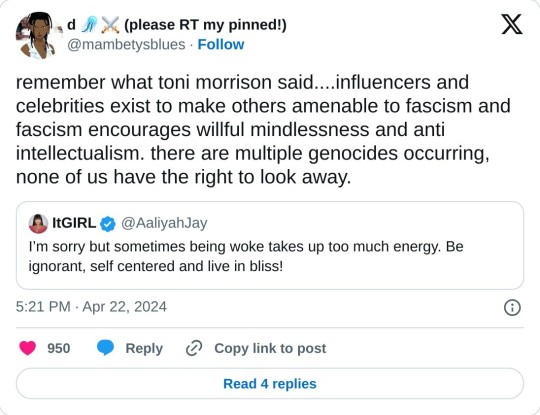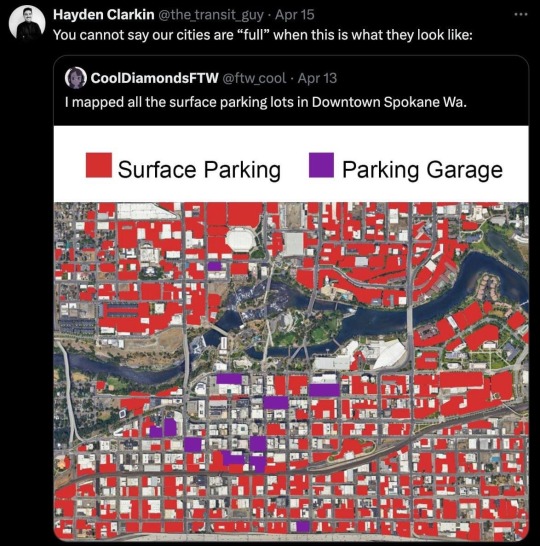Text
11K notes
·
View notes
Text

can we be kind to each other
19 notes
·
View notes
Text

youtube that is a big question
8K notes
·
View notes
Text
@stifledlaughterao3 also sent me this post, good to know I have a reliable brand ^_^
that crying “babe I’m so horny!” meme but the response references the queen’s funeral holiday
11K notes
·
View notes
Text
The endlessly cycling disappointment of learning that "transcending political squabbling" sounds great but will boil down to "transcending democracy" every single time.
'we transcend petty political tribalisms like left and right' is--not always, but much too often-- a marker that what you're about to read is unfiltered, high-octane, triple-distilled Turbo Fascism
430 notes
·
View notes
Text
The difference between あのー and えーっと
As I touched on in my japanese goncharov post, it’s amazing how much novel research, entertainment, and art are locked behind a language barrier. Even though as english speakers, we are privileged to have many things translated into our language, it’s a simple fact that most things will not be translated into most languages.
I am a huge fan of ゆる言語学ラジオ, a japanese podcast about linguistics. The hosts recently released a book, 言語沼, which goes into detail about some of the subconscious rules native japanese speakers follow but aren’t consciously aware of (an english equivalent might be that adjective-ordering rule we follow e.g. big brown cow, not brown big cow). I’m finding it fascinating, and I wanted to discuss some of it here in english, because I think people learning japanese would find some of these things really useful. It’d be a shame if this knowledge stayed stuck behind the japanese language barrier when the people who would find it the most useful can’t speak japanese fluently enough to read it!
The book talks about how most Japanese people will think of 「あのー」 and 「えーっと」 as having the exact same meaning - they’re both “meaningless” filler words. Despite their belief that they’re the same, those same native speakers will subconsciously only use あのー in one particular type of situation and 「えーっと」 in another, and even feel confused or annoyed if they hear another speaker use one in the wrong context.
So what’s the actual difference? 「えーっと」 is used when the speaker is taking time to remember or solve something. For example, the following exchange is very natural:
Person A: 6 x 5は?
Person B: えーっと、35だ
This makes it a pretty versatile filler word! You can use it pretty much anywhere. Another example would be when you’re talking to yourself, trying to remember where you left your keys.
えーっと、鍵どこ置いたっけ?
On the other hand, あのー is much more specific. It can only be used when you’re taking time to figure out the best way to phrase something. For example, when you’re trying to get a stranger’s attention.
あのー、ちょっといいですか?
In contrast, if Person A was addressed with 「えーっと、ちょっといいですか?」by Person B, they’d feel it was rude because instead of considering how to say something, B is considering what to say, which gives the impression that they hadn’t even figured out what they needed to ask before addressing Person A.
This gives 「あのー」 a more ”polite” feeling than 「えーっと」, even though neither is actually more polite than the other. They’re just used in different circumstances.
Let’s quickly look at the example with the lost keys again. If you replace the filler word:
あのー、鍵どこ置いたっけ?
It is very unnatural. The authors of the book jokingly say that it sounds like you’re talking to a ghost, because 「あのー」 is only used when you’re figuring out how to phrase something, and you wouldn’t worry about that if you’re talking to yourself.
Also, did you know even japanese children properly use each filler word in the correct situation? Despite almost all japanese people (even as adults) being unaware of this rule, they’re subconsciously abiding by it even as children - just from listening to their parents follow the same rules!
It really is amazing how good your subconscious mind is at acquiring language, and how terrible your conscious mind is at it. If you’re not already, I highly recommend integrating a lot of simple language content (e.g. youtube, kids shows, etc) into your study routine - listening to people talk is simply the fastest way to become fluent in your target language.
209 notes
·
View notes
Text
reblog for sample size !!
9K notes
·
View notes
Text
7K notes
·
View notes
Text

When the late night lewd reblogs hit
15 notes
·
View notes
Text
I too love noticing how, when there is no genocide going on, the famous people all fade away and we live in atomized localism, but then when a genocide starts celebrities just start popping out of the woodwork like termites feasting on our political consciousness. Tswift concert ticket sales directly tracking refugee numbers and the like.

5K notes
·
View notes
Text
Do I recommend reading The Great Transformation today, you are obviously asking, just bombarding my inbox to know? Presuming you are interested in economic history? No, and not even primarily for the above reason - its a complex book touching on a ton of political economy topics, but time has marched on for many of those topics, and so its just a confusing mess to sort the right from wrong and relevant from irrelevant. It would be the least efficient way to learn about anything it touches.
But if you care about the history of economic history and the "debates" that have raged through it and the related disciplines, its not optional, you have to read it. Not just because its "famous", I try not to do that - you can skip Das Kapital for example, its not a bad work but its a very inefficient way to get to Marx's important ideas, or like Malthus's Essay on the Principle of Population you already know, the summary gets you the content, don't worry about it. But The Great Transformation is one of those works that is touching on every one of the big debates of its era in substantive ways and pushing it forward. I could edit it for sure, you prob need only 50% of the chapters - but for our purposes that is a high percentage.
Saw some discussions of people "taking down" Karl Polanyi's 1944 The Great Transformation in response to some other articles mentioning it, which is always amusing to me because its a very dead horse to beat. In short, Polanyi was the founder of the "markets-as-modernity" idea, where before the modern era states and economies did not function on supply and demand, but instead on things like gift and reciprocity. It was never a very coherent idea (Supply and demand is an inherent aggregating feature of human society) but direct evidence has compounded with logic to relegate it into the past. His ideas that say ancient Babylon had centralized prices built around temple donations has been set aside in the face of the evidence of incredibly complex exchange economies that ran through Mesopotamia - we even see things like derivative contracts! Because of course you do, financial risk is inherent to economics, so societies will experiment around mitigating it.
There is a perfectly coherent "steelmanned" version of this idea that is quite robust today - markets are always with us and were never invented, but they are also socially constructed and their scope changes based on context, with a large modern expansion. Did the Roman Empire have a market for wages, alongside goods? Yes, of course it did - but that market was quite "distorted" by the mass-scale slavery endemic to the economy. Slave vs free labor economies both have "markets" and function alongside them, but for the actual lived human experience these are night and day systems, and based on deep social institutions, not at all "inherent abstract forces". Lots of societies had differences like this - sometimes ancient governments did try to dictate prices! They failed, but they tried, its a difference.
And more broadly under low-productivity systems most people engaged in subsistence farming, and interacted minimally with trade systems. If most of your economic "units" don't engage in trade, the markets don't matter as much, but over time this changed, and as more and more people "entered" the market that is both a change in itself and created knock-on effects in urbanization, specialization, financial institutions, etc, that is totally fair to describe as a "transformation". Starting in the 18th century its very clear the world began a rapid shift to specialization & wage labor in a way never seen before, its a new society in many ways.
Problem is none of this steelman is anywhere close to what Polanyi was saying. He was definitely claiming that market exchanges and supply and demand price shifting and all that were optional, and could be (and historically were) replaced by gifts or redistribution policies or the like. He is just wrong about this and there is no reason to bother trying to rehabilitate it. Doesn't make him wrong about everything! States definitely also "constructed" markets and put a lot of work into that, for example, a big point of his. But you see the "pre-market era of history" pop up in discourse, journalism, politics, etc from time to time, and as an economic historian its always a groan moment. No one is debating this anymore.
21 notes
·
View notes
Text
Saw some discussions of people "taking down" Karl Polanyi's 1944 The Great Transformation in response to some other articles mentioning it, which is always amusing to me because its a very dead horse to beat. In short, Polanyi was the founder of the "markets-as-modernity" idea, where before the modern era states and economies did not function on supply and demand, but instead on things like gift and reciprocity. It was never a very coherent idea (Supply and demand is an inherent aggregating feature of human society) but direct evidence has compounded with logic to relegate it into the past. His ideas that say ancient Babylon had centralized prices built around temple donations has been set aside in the face of the evidence of incredibly complex exchange economies that ran through Mesopotamia - we even see things like derivative contracts! Because of course you do, financial risk is inherent to economics, so societies will experiment around mitigating it.
There is a perfectly coherent "steelmanned" version of this idea that is quite robust today - markets are always with us and were never invented, but they are also socially constructed and their scope changes based on context, with a large modern expansion. Did the Roman Empire have a market for wages, alongside goods? Yes, of course it did - but that market was quite "distorted" by the mass-scale slavery endemic to the economy. Slave vs free labor economies both have "markets" and function alongside them, but for the actual lived human experience these are night and day systems, and based on deep social institutions, not at all "inherent abstract forces". Lots of societies had differences like this - sometimes ancient governments did try to dictate prices! They failed, but they tried, its a difference.
And more broadly under low-productivity systems most people engaged in subsistence farming, and interacted minimally with trade systems. If most of your economic "units" don't engage in trade, the markets don't matter as much, but over time this changed, and as more and more people "entered" the market that is both a change in itself and created knock-on effects in urbanization, specialization, financial institutions, etc, that is totally fair to describe as a "transformation". Starting in the 18th century its very clear the world began a rapid shift to specialization & wage labor in a way never seen before, its a new society in many ways.
Problem is none of this steelman is anywhere close to what Polanyi was saying. He was definitely claiming that market exchanges and supply and demand price shifting and all that were optional, and could be (and historically were) replaced by gifts or redistribution policies or the like. He is just wrong about this and there is no reason to bother trying to rehabilitate it. Doesn't make him wrong about everything! States definitely also "constructed" markets and put a lot of work into that, for example, a big point of his. But you see the "pre-market era of history" pop up in discourse, journalism, politics, etc from time to time, and as an economic historian its always a groan moment. No one is debating this anymore.
21 notes
·
View notes
Text
As is my brand, gonna be the YIMBY in the room who pushes back on this a bit. Repeal parking minimums in Spokane if you want, its a dumb subsidy, but I doubt it would change too much because urbanism isn't one size fits all. Spokane is a "city" of 230,000 people; its not small but its certainly not large, and by city we mean a wide field of suburban lots. And its in Middle Of Nowhere, Washington, it is no exurb of Seattle or anything like that.
If you live in Spokane its because you want to live in a suburban house with a yard and stuff. There is not much of a point in trying to make Spokane like Seattle, Seattle is Seattle, that is where the dense urban living and tech jobs and all that in the area are gonna go. Meanwhile Spokane's big industries are like wheat farming & logging. Many people like suburbia, they want that lifestyle, and Spokane's economic realities are built for that. Which means that everyone is, inherently, going to drive everywhere, which means they want parking next to every place they want to go. Which means stores are gonna build that parking to meet the demand.
If Spokane individually wants to embark on densification & walkability, its welcome to, but most "Spokane's" in America won't because there isn't enough people who want that. And there certainly wouldn't be enough if the actual high-demand cities like Seattle did actually launch more real expansions, which is what urban living people actually want. So its a bit of an "eye on the prize" issue - some places are going to want suburbia, and in suburbia everywhere needs parking. No reason to try to fight the least impactful battles imo.

832 notes
·
View notes
Text
The extreme irony of Trump sometimes being the most authentic politician around

one of the greatest to ever do it
2K notes
·
View notes
Text
Look they arent doing homework anymore we got to teach them grit somehow
Apparently college campuses across the nation have decided to show their commitment to student safety by inviting armed men to beat their students with truncheons.
119 notes
·
View notes
Text
Its doubly funny to try to do this with "incels" - they are pretty much not real! Not in like a political movement sense, it was like some dudes on a subreddit and the rest is just memes. They aren't "taking power" or threatening anything culturally; and ofc they are already at maximum social outcast status, you can't rehabilitate them even if you wanted to. The idea that you need to "fight back" against incels is one of the purest examples of inventing an enemy.
incels on tiktok: women are blackpilled on looksmaxxing after a stacy got 52m views
people in real life: hey man how's it going
2K notes
·
View notes
